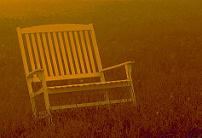There is a home where a mother grows only women, like vines crawling over wooden sticks, strayed on the bricks. The food are for women alone, the doors for ladies, the clay dolls for girls, the dusks are for heroine-stories or dame-tales with no mention of dukes, the old lady's face sleeping girls see
reflected in mirrors everywhere framed by brass anturium aquatints and blood-colored blurs, while the ceiling like sky with glowing stars is dim-lit by lamps whose shape is a woman's naked torso. Men are not spoken of except to curse them in the patio that reads to ladies in rockers morning news and daily
breads, or in the kitchen while cooking pasta, vegetable salad with mayonaisse and eggs, the same garnish rubbed on every woman's hair lying on the floor before sent to bed with an old novena. The windows must have forgotten the lads in school uniform playing touch-and-go on the yard, waiting
for the bus at dawn, while the tables attempt to recall being lifted by strong hands on Sundays. This house avoids muscles, musk-scents, deep voices that break the floor the way quakes leave cracks in walls that women can touch and mourn long after, their hands failing to sew the cracks together only cover
them with embroideries and needleworks of the moon. The broken footstools are in the junk healing their legs, the closets curing their ribs, the plates letting the sun's rays through holes soothe their chipped outstretched hands. Anything about men has been locked into the attic with all their evilworks
and moments of outburst. But during rain, when each lady has gone to bed, darkness steps in like their shadow embarking on an isolation journey, and their short breaths collect, shed vines crawling down the home's sandwashed cheeks.
skip to main |
skip to sidebar




We reply to submissions within 48 hours
We want only the best pieces of poetry, so it is our policy that we reply to submissions within 48 hours.
Archives

Photo credit: Christopher Woods is a writer, teacher and photographer. He lives in Houston and in Chappell Hill, Texas. He shares a gallery with his wife Linda at Moonbird Hill Arts (www.moonbirdhill. exposuremanager.com/)
Copyright
Copyright reverts to authors upon publication. For reprints, seek approval from the author first and kindly credit Poem2day as the first publisher.
Email Us
Concerns, suggestions, inquiries? Email us at poem2day [at] gmail [dot] com. For submissions, please use poem2daysubmit [at] gmail [dot] com









